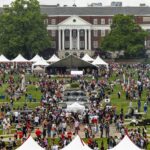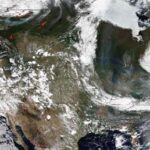By Patrick Farrell
According to environmental analyst Lester Brown, armed aggression against the U.S. would not place in the “top five,” when ranking the largest security threats to the nation.
Named “one of the world’s most influential thinkers” by the Washington Post and the Founder of both the Worldwatch Institute and the Earth Policy Institute, Brown believes there is a major and overlooked threat to not only the U.S., but to the global community on a whole – food scarcity.
On Monday, November 12th at the University of Maryland College Park campus, Brown, a graduate of the University of Maryland, addressed a crowd of students and faculty gathered at the inaugural Council on the Environment “Distinguished Lecture Series” to speak on water shortages, soil erosion, and increasing carbon emissions.
These three factors, according to Brown, may facilitate a new era of food nationalism that will have major implications across the globe.
This past year, there has been a major tightening of the world’s food supply. The price of both corn and soy beans hit an all time high, and while Brown notes that our country may feel “isolated” from the effects, in due time, we will not be.
Historically, countries around the world who are subjected to low food supplies will often times eat one meal per day, Brown said.
But according to the speaker, foodless days have become a “routine part of life” in many third world countries around the world. In Nigeria, 27 percent of people said that they schedule foodless days at least once a week. The same goes for India and Peru, who reported 24 percent and 14 percent, respectively, and some times reported undergoing foodless days twice a week.
Brown continued that during a period between 2007 and 2008 (when grain prices doubled), many countries, including Russia and Argentina, banned exports in order to keep grain prices down.
Vietnam, the largest exporter of rice, banned rice exports entirely. Browns says much of the increased demand, as well as the resulting scarcity of food, can be attributed to population growth.
Ultimately, this could be a clear indication of what is to come in the future.
Brown went on to state that the problem with producing more grain is not simply land availability, but water availability. The speaker said that as of today, around half of the entire world lives where aquifers are over pumped.
Here in the U.S., Texas and California are notable examples of depleting aquifers, in order to cope with the growing demand of water in cities.
“Farmers today are faced with an uncertainty… an unpredictability,” Brown said. That unpredictability is climate change.
Brown said that according to a study performed in the U.K., a 1 degree rise in Celsius would reduce corn production in the U.S. by 16%.
What this represents according to Brown, is that the agricultural and climate systems are simply “out of sink.”
This paired with the loss of top soil in areas such as Western Mongolia and Haiti – attributed to erosion – is an imminent threat to food production everywhere.
It is this same presence of erosion, Brown says, that has led countries such as France, Germany, and all of the United Kingdom to hit the “plateau” of the grain harvest.
Paired with the record growth in grain demand, it is this “glass ceiling” on food production that Brown says will dawn the era of food scarcity.
“I don’t think it’s going to be more destructive storms… I don’t think it’s going to be rising sea levels.” According to him, food scarcity will be the “wake up call” that everyone is waiting for.
As the discussion came to a close, Brown mentioned two opportunities for action that all in attenance could take part in.
The first, helping to close coal plants across the country, especially the one near-by on the south side of the Potomac River.
Brown also encouraged the audience to boycott the industry of bottled water, citing instances where in most states, tap water restrictions are tougher than those restrictions imposed on bottled water.
After all, Brown said, “saving civilization is not a spectator sport… this is something we all have a stake in.”






